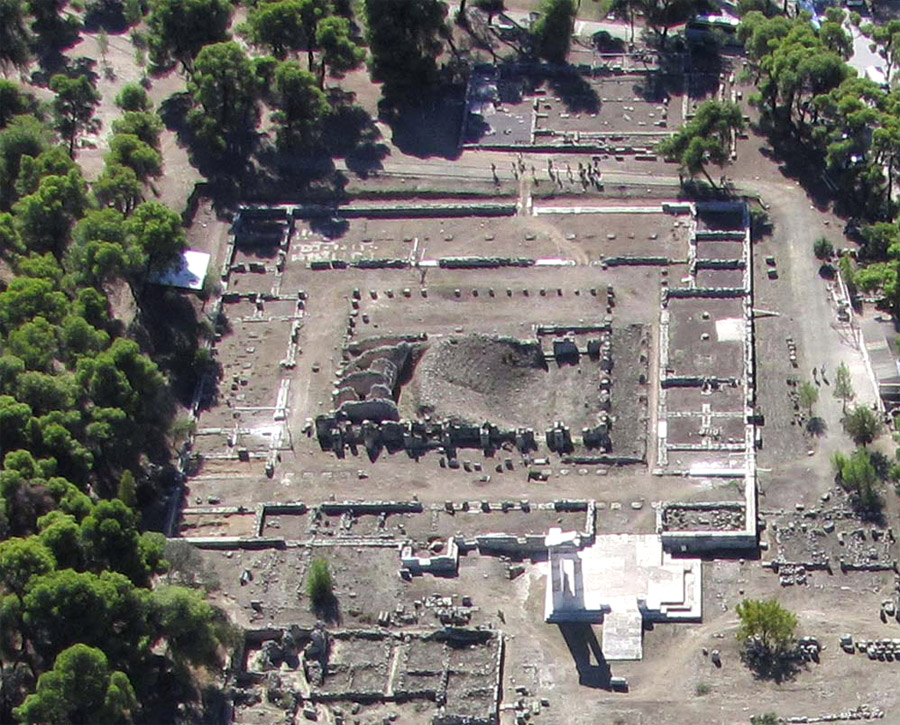
A Small roofed theater (Odeon) of the Roman period, which occupied part of the atrium of the “Gymnasium” – Ritual Restaurant (a building of the Hellenistic era) in the Asclepion of Epidaurus.
Epidaurus Odeon
Roman Odeon
Small roofed theater (Odeon) of the Roman period, which occupied part of the atrium of the “Gymnasium” – Ritual Restaurant (a building of the Hellenistic era) in the Asclepion of Epidaurus.
Contemporary photographic documentation of the monument was concluded by the Epidaurus Monuments Preservation Committee (ESME) and are now in the Commission’s archives in Epidaurus. Of particular interest are pictures of the Archaeological Society which were taken immediately after the excavation (~ 1900), as they show the monument in a much better condition than the present one (copies of these pictures are also found in ESME’s archives). Floor plans, plans of facades and sections have been completed and published at the time of the excavations. Modern architectural mapping and reconstructions plans have been drawn up by Kl. Aslanidis and are partly published. Additionally, a small number of photos and drawings of the monument are included in some of the following publications.
1.P. Kavvadias, The sanctuary of the Asclepion of Epidaurus, Athens 1900, 150-54
2.P. Kavvadias, “On the excavations in Epidaurus,” PAE 1904, 61-62, table A
3.N. Faraklas, Epidauria, Ancient Greek Cities 12, Athens 1972,71.
4.R. Ginouvès, Le théâtron à gradins droits et l’odéon d’Argos, Études Péloponnésiennes VI, École Française d’ Athènes, Paris 1972, 12, 90 p.2, 96 p.5, 113, 115, 121 p. 4 & 6, 123, p.1, 124 p.1 & 4, 125 p.3, 5 & 6, 128 p.1, 131 p.1, 3, & 4, 163 p. 1, 3, and 7, 171 p.1, 174 p. 4, 175 p.3, 176 p.4, 178 p. 2, 180 p. 1, 184 p. 2 & 5, 190 p.1, 191-192, 196-197, 200, 203, 208, 242-243, 249.
5.R. Meinel, Das Odeion. Untersuchungen an überdachten antiken Theatergebäuden, Frankfurt am Main 1980, 225-229.
6.R. A.Tomlinson, Epidauros, Austin, 1983, 83.
7.V.E.E.S. Kyriaki, “The ‘Gymnasium’ Complex”, The Propylon of the “Gymnasium”, and the Tholos in the Asklepieion at Epidaurus, Preservation and Partial Restoration Proposals, CPEM Athens 1988, 44-47.
8.L. Palaiokrassa, “Recent Excavations at the ‘Gymnasium’”, he Propylon of the “Gymnasium”, and the Tholos in the Asklepieion at Epidaurus, Preservation and Partial Restoration Proposals, CPEM Athens 1988, 21-35.
9.G. Izenour, Roofed Theaters of Classical Antiquity, New Haven 1992, 119-25, 156, 161.
10.V. Labrinoudakis / E. Lebidakis, “Research profits through the care of conservation,” The Asclepion in Epidaurus, The Home of Antiquity’s God-Physician, The Conservation of its Monuments, CPEM, Regional Authority of the Peloponnese 1999, 82.
11.Kl. Aslanidis, The Conservation of the Odeion of Epidaurus, Dissertation submitted for the MA in Conservation Studies, University of York, Department of Archaeology, incorporating the IoAAS, September 2000.
12.St. Katakis, The sculptures of the Roman times from the sanctuary of Apollo Maleata and Asclepius, Athens 2002, 307, 508.
13.Kl. Aslanidis, The Roman Οdeion at Epidaurus, JRA 16 (2003), 300-311
Asclepion of Epidaurus
According to the latest estimates, the Odeon of Epidaurus should be dated to the end of the 2nd or early 3rd century AD. Several construction phases can be distinguished on the building, with the stage and the orchestra’s mosaic placed after the original construction.
The Odeon occupies the largest, north, part of the inner courtyard of the “Gymnnasium” – Ritual Restaurant of Asclepius, incorporating columns of the internal peristyle in its exterior walls. Its shape is rectangular (30.20 x 38.80m.), with protruding brackets of masonry. The roof was wooden and probably gabled, with pediments on the narrow sides.
The monument is preserved at a small height compared to its original size. Also preserved are the first nine rows of the cavea, including the VIP proedria seats, as well as the infrastructure walls of the upper diazoma at a height of about 3.30 m., the lower parts only of the stage walls, and the mosaic of the orchestra. The conserved parts, despite their average state of preservation, give the visitor a fairly clear picture of the monument’s original form. Growing plants in the joints intensify the damage caused by the penetration of water, resulting in wearing off of the uppermost part of the walls and of mud-bricked seats, which can be hardly distinguished. The mosaic of the orchestra is filled in. Addressing these problems will significantly help in highlighting the monument.
To monument was discovered by P. Kavvadias in 1891. Additional excavations or architectural cleanups have been taking place since the late 1980s and onwards, enriching our knowledge on many aspects of the monument and the use of the surrounding space. No retaining works or restorations have taken place.
Simple visit. The monument is fenced and visitors are only permitted to move around it.
The monument is not in use.
Initial excavation was conducted by the Archaeological Society. Modern research and studies have been made by the permanent or affiliate staff of the Committee for the Preservation of Epidaurus Monuments (CPEM), which belongs to the Hellenic Ministry of Culture’s Management Fund for Archaeological Projects (TDPEAE).
The monument is situated in Asclepion of Epidaurus and belongs to the jurisdiction of the Ministry of Culture / 4th Ephorate of Prehistoric and Classical Antiquities. Matters of research/restoration/preservation are dealt with by the CPEM.
37.59764°
23.075334°
| Name | Date | Amount (€) |
|---|---|---|
| Diazoma Association | 100.00 | |
| ΤΟΚΟΙ ΚΑΤΑΘΕΣΕΩΝ ΚΟΥΜΠΑΡΑΔΩΝ ΔΙΑΖΩΜΑΤΟΣ | 900.00 | |
| ΜΑΘΗΤΙΚΗ ΚΟΙΝΟΤΗΤΑ ΓΥΜΝΑΣΙΟΥ ΣΧΟΛΗΣ Ι.Μ. ΠΑΝΑΓΙΩΤΟΠΟΥΛΟΥ | 1.500.00 |
| Expenditure | Date | Amount (€) |
|---|---|---|
| 10/2015 ΑΓΟΡΑ ΥΛΙΚΩΝ ΣΥΝΤΗΡΗΣΗΣ ΤΟΥ ΜΝΗΜΕΙΟΥ | 656.80 | |
| ΡΩΜΑΪΚΟ ΩΔΕΙΟ ΕΠΙΔΑΥΡΟΥ ΑΓΟΡΑ ΥΛΙΚΩΝ ΑΠΟΚΑΤΑΣΤΑΣΗΣ – 08/07/2015 | 958.13 | |
| ΡΩΜΑΪΚΟ ΩΔΕΙΟ ΕΠΙΔΑΥΡΟΥ ΡΩΜΑΙΚΟ ΩΔΕΙΟ ΕΠΙΔΑΥΡΟΥ – 11/05/2015 | 855.39 |